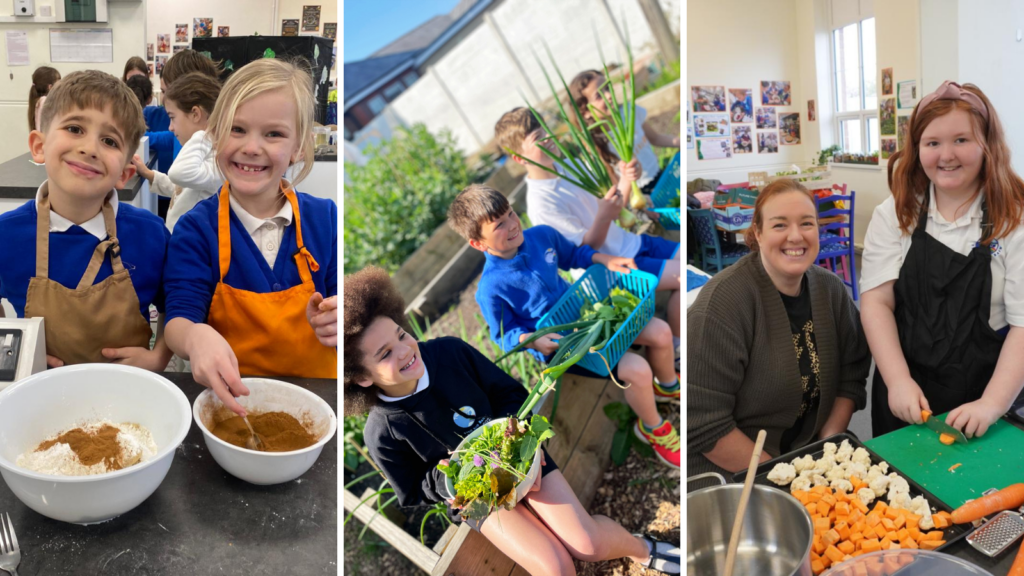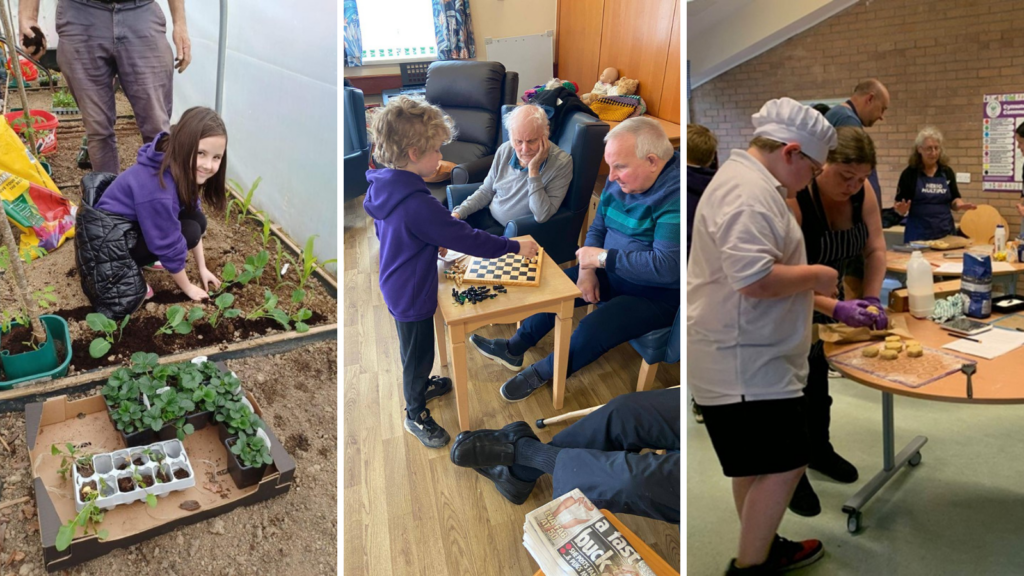How community focused schools are transforming education in west Wales

Over 100 educators from across Wales came together yesterday (Monday, 31 March) for a Community Focused Schools Conference in Carmarthen.
Organised by British Council Wales and the Welsh Government, the event showcased how community-based projects are transforming education and local communities, with international speakers also sharing their experiences and insights.
Among the schools featured was Ysgol y Bedol in Garnant, Ammanford. The primary school, situated in a former coal mining village, has built a deep connection with the local community, breathing new life into the area.
Established 20 years ago as part of the Welsh Government’s 21st-Century Schools Initiative, Ysgol y Bedol was designed with community use in mind. It includes facilities such as a community library, police room, gym, sports hall, and café.
They run a range of community-focused projects, including an intergenerational initiative that pairs students with elderly residents from a nearby day centre to engage in games and activities. Headteacher Gethin Richards explained, “Our school has always been built with the community at its heart. From day one, we’ve made sure the school isn’t just an educational space but a true community space. It’s not just about teaching children here; it’s about fostering something bigger. What we’re seeing in this initiative is that the older generation are feeling more part of the community, and the students also get to learn from their stories and experiences.”
In addition, the school has established a café that serves not only the school community but also contributes to supporting local causes. Students actively participate in preparing food, growing produce, and organising events. The school also runs a “food and fun” club during the summer holidays, providing meals and activities for children from disadvantaged backgrounds.
“It’s all about connecting with people,” Gethin says. “By involving our students in activities like this, they learn the value of being part of a community and the impact they can have on the people around them.”
To support these initiatives, the school has been creative in generating funding. Through its community-driven activities, it’s able to reinvest back into the school. Gethin explains, “We’ve created activities like the café that not only engage the students but also help fund the school activities. We use those funds to support everything from school trips to enhancing student resources.”
The school has also forged partnerships with local organisations, such as a nearby wind farm, to support environmental and educational projects. This collaboration has enabled the school to develop a garden, chicken coop, and polytunnel, providing students with valuable hands-on learning experiences.
“We’re not just teaching in a classroom,” says Gethin. “We’re involving the students in real-world projects that have a positive impact on the environment and the community. These partnerships allow the students to connect what they’re learning to the world around them.”
Community hub
For Lucy Lock, a Year 3 teacher and curriculum lead at Ysgol Bro Banw Primary school in Ammanford, they have worked hard to make sure the school is a true hub for the entire community, involving pupils in food waste projects, community meals, and growing food.
Lucy explained, “For us, it really began with the Welsh Government’s Big Bocs Bwyd scheme, which was one of the first steps in making our school a hub for the community. The idea behind Big Bocs Bywds was to engage young people who were struggling to connect with traditional education. By working on hands-on projects and learning in a more practical, real-world context, these students started to build their confidence and skills in ways that resonated with them.
“From there, we expanded our work, collaborating with the charity Foodshare to address food insecurity. It’s one less worry for families, helping ensure that students can focus on their learning rather than being distracted by hunger. The positive impact of Foodshare on both students and families has been huge, reducing barriers to education and making a real difference in the community,” said Lucy.
For Lucy, an important part of the project was adopting food literacy into the curriculum. She said: “We recognised that teaching children about food—not just how to cook, but understanding where it comes from, how it affects our health, and how to make healthier choices—was vital.”
Students at the school are also leading initiatives like the Waste Wizards programme, focused on sustainability, and a pupil-led café, which provides hands-on learning in cooking, customer service, and business management.”
Lucy said: “These initiatives empower students with practical work experience, teaching them skills in cooking, customer service, and financial management. It’s all about giving students ownership of the project. They make decisions, take responsibility, and learn life skills through trial and error.
“The active involvement of parents and volunteers has been integral to the success of these initiatives. Many parents and community members have contributed their time and expertise and played a critical role in the broader network of support we’ve built.”
To further expand its work with the community, the school recently secured Lottery funding to create a new state-of-the-art kitchen. Lucy said: “This kitchen will allow us to expand our community programmes, offering opportunities for students to learn about cooking and nutrition while also providing a space for local cooking classes and community events.
“Throughout all of this, we’ve stayed committed to celebrating the cultural diversity within our school, we’re working to ensure that every student, regardless of their background, feels valued and supported. This is about more than just education. It’s about creating an environment where every child can thrive, feel secure, and be part of something bigger than themselves.”
Innovation
Meanwhile, at Ysgol Pen Rhos in Llanelli, Headteacher Joe Cudd is using innovative approaches to strengthen community ties. The school, which is based in an area identified as being severely deprived, seeks to ensure pupil voice, family engagement and wellbeing is at the heart of the school ethos.
Joe said: “We believe that families are the first educators, and our role is to support them while empowering our pupils to make a difference. Our work is about more than just traditional education. For instance, we lead innovative programmes such as using Minecraft to teach students about climate change, and our beekeeping programme isn’t just about sustainability; it’s also helping to support mental health.
“One of the most impactful projects we’ve undertaken involved bowel cancer awareness. In our community, the uptake of bowel cancer screenings was very low. So, we ran the Moon Dance Cancer Initiative, where primary school children worked with a leading colorectal surgeon to learn about colorectal cancer, its signs, and symptoms. They then took that message out into the community, which led to a significant increase in bowel screening uptake. It’s a great example of how children can be powerful advocates for their community.”

In addition to these grassroots efforts, Ysgol Pen Rhos is also at the forefront of using AI to drive community transformation. Joe said: “Through AI, we analyse local demographic data to better understand community needs and create actionable plans. Currently, we’re working with three schools in Wales to develop a model that other headteachers can adopt to drive community-focused initiatives. Our goal is to make sure that every school is not just a place for academic learning, but a driving force for positive change in the community.
“At the end of the day, these initiatives are all about making sure that our school isn’t just a place for academic learning but a vital part of the community, helping the children and their families thrive in every possible way.”
The Community Focused Schools conference was also attended by keynote speakers Lee Elliot Major, Professor of Social Mobility at the University of Exeter, and Michelle Dolan, Principal of St Louis Secondary School in Dundalk, Ireland.
Nicola Edwards, Deputy Director of the Equity in Education Division at the Welsh Government, opened the event and Lynne Neagle, Cabinet Secretary for Education, provided a welcome message.
Speaking about Community Focused Schools, Lynne Neagle, Cabinet Secretary for Education, said:
“I want all schools in Wales to be Community Focused Schools. This is why I am so pleased to be investing over £31m in Community Focused Schools approaches and facilities this financial year.
“By working together to share ideas, best practice and research from across Wales and other countries we can continue to drive forward the Community Focused Schools agenda, helping secure the best foundations for the learning and development of children and young people right across Wales.”
This marks the third Community-Focused Schools Conference in Wales organised by British Council Wales, following successful events in Cardiff and Wrexham. The conference continues to provide a vital platform for sharing knowledge, fostering collaboration, and inspiring further community engagement in education.
Ruth Cocks, Director of British Council Wales, added, “We are proud to support and celebrate the work of schools in Wales that are making a tangible difference in their communities. These initiatives highlight the power of education to bring people together and drive meaningful social change. By bringing renowned delegates together with local leaders and educators, we can share best practices and build a global network of innovation and collaboration. Together, we can shape the future of education in Wales and nurture the potential of every learner.”
To find out more about British Council Wales’ work in Wales, visit https://wales.britishcouncil.org/en or follow on X, Facebook, or Instagram.
Support our Nation today
For the price of a cup of coffee a month you can help us create an independent, not-for-profit, national news service for the people of Wales, by the people of Wales.






This is an initiative with a lot of merit that needs rolling out. For many learners, especially the less academically inclined ones, traditional classrooms don’t work. The new super-schools may feel like detention centres with mandatory cosplay, where they are forced to memorize boring facts for Thursday night pub quizzes which they could instantly find on their phone- if they weren’t deprived on them! There is a proverb (possibly African): “it takes a village to educate a child”. Wales needs a generation of self-reliant, self-actualized organizers, team-workers, and real-world problem solvers capable of turning society’s aspirations into reality.